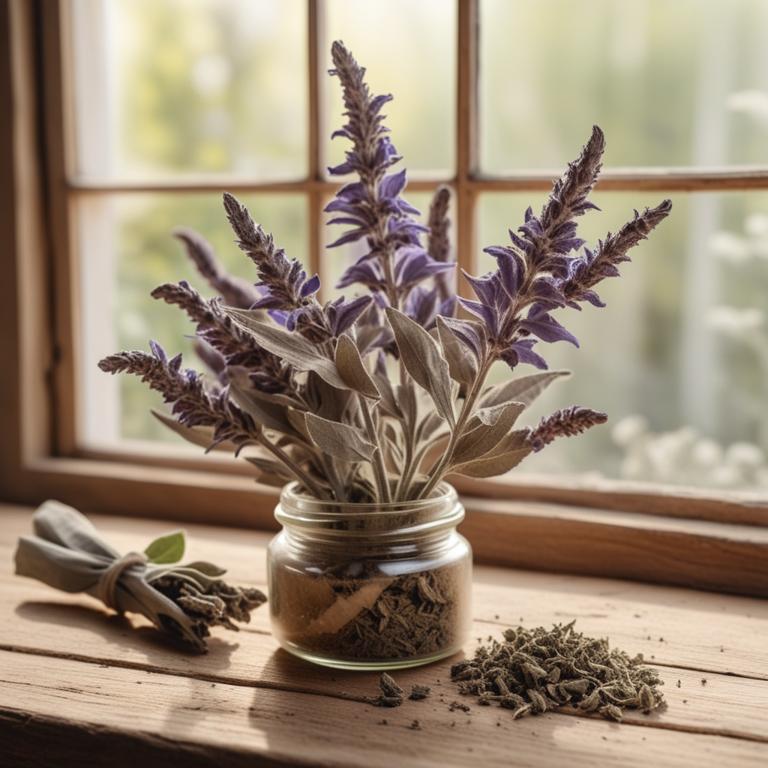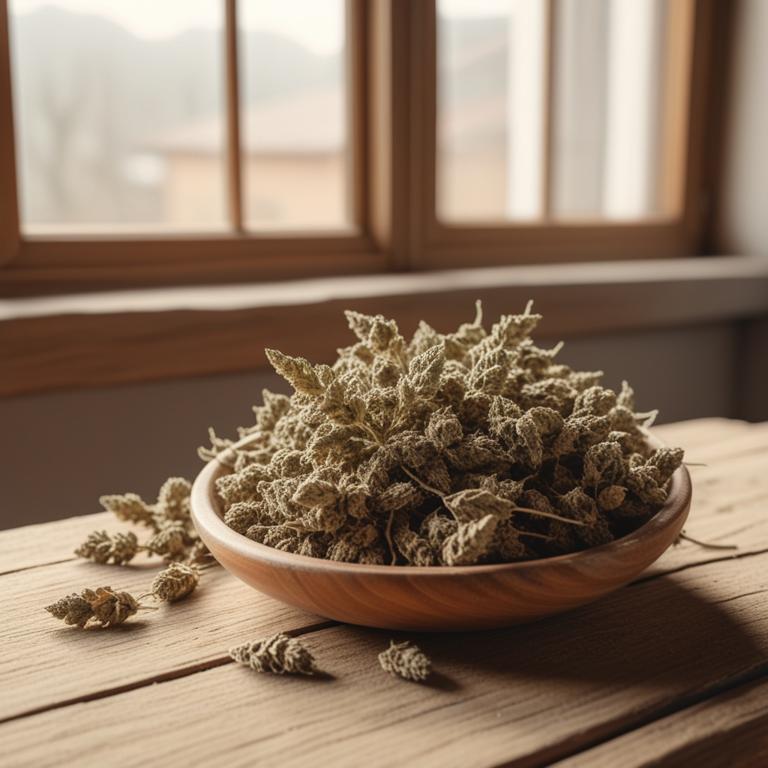Updated: Dec 1, 2024
Natural Treatments for Nail Fungus: Causes and Herbal Remedies

Nail fungus is a common problem where a fungal infection grows under your nail, causing it to become thick, brittle, and discolored.
It can be painful and affect your daily life, making it hard to wear your favorite shoes or even do everyday activities. Nail fungus is usually caused by a combination of factors, such as poor foot hygiene, warm and humid environments, and wearing tight shoes that don't allow your feet to breathe. To treat nail fungus, some people turn to herbal remedies.
Herbs like tea tree oil, oregano, and thyme have antifungal properties that can help combat the infection. These herbs can be used in various preparations, such as teas, oils, and creams. Drinking tea tree oil-infused tea or applying oregano oil directly to the affected nail can be a good starting point. You can also add a few drops of thyme essential oil to your bath water to help soothe and heal your nail.
It's essential to note that while herbal remedies can be effective, they may take time to work, and it's crucial to be consistent with your treatment.
Table of Contents
What leads to the development of nail fungus?
The main causes of nail fungus are a combination of factors that create an ideal environment for fungal growth.
Fungal infection is the primary cause, as it thrives in warm, moist environments, particularly between the toes or under tight shoes. Onychomycosis is a type of fungal infection that directly affects the nails, causing them to become thick, brittle, and discolored.
Athlete's foot, also known as tinea pedis, is a fungal infection that affects the feet, often spreading to the toenails. Bacterial infection can also contribute to nail fungus, particularly if the nail is damaged or broken, allowing bacteria to enter and cause infection. Paronychia is a bacterial infection that affects the skin around the nail, leading to redness, swelling, and pain, which can also create an environment conducive to fungal growth.
Ringworm, a fungal infection that affects the skin and hair, can also spread to the nails, causing nail fungus.
How do herbs help in addressing nail fungus?
Using herbs to treat nail fungus can be a great option for those who want a natural approach.
These herbs have been shown to have antifungal properties, which can help kill the fungus that's causing the problem. One of the main benefits is that they can be used externally, applied directly to the affected nail, making them a convenient option. Some herbs can also help to reduce the thickness of the nail, which can make it easier to cut and file.
Additionally, these herbs can be used in combination with other treatments, such as tea tree oil or vinegar, to create a powerful antifungal solution. Some herbs can also help to promote healthy nail growth, so you can start to see results in just a few weeks. This can be especially helpful for those who have tried other treatments without success.
By using herbs, you can also avoid some of the harsh chemicals found in over-the-counter medications, making it a gentler option for sensitive skin and nails.
What are the chief medicinal herbs used to alleviate nail fungus?

Herbs have been used for centuries to treat various health issues, and nail fungus is no exception.
One of the most effective herbs for nail fungus is Melaleuca alternifolia, also known as tea tree oil. It has antifungal properties that can help combat the fungus that's causing the infection. When applied topically, the oil can penetrate the nail and surrounding skin, reducing the growth of the fungus and promoting healthy nail growth. Another herb that's gaining attention for its nail fungus-fighting properties is Curcuma longa, or turmeric. Curcumin, a compound found in turmeric, has potent antifungal and antibacterial properties that can help eliminate the fungus. It also has anti-inflammatory properties, which can reduce redness and swelling associated with nail fungus. Syzygium aromaticum, or clove oil, is another herb that's been used to treat nail fungus.
It has antimicrobial properties that can help combat the fungus, and its antiseptic properties can help reduce inflammation and promote healing. Origanum vulgare, or oregano oil, is another herb that's been used to treat nail fungus. It has antifungal and antibacterial properties, as well as anti-inflammatory properties, making it an effective treatment for nail fungus. Lastly, Olea europaea, or olive oil, can be used as a carrier oil to help apply the other herbs topically. It's also rich in antioxidants that can help promote healthy nail growth and reduce inflammation. These herbs can be used individually or in combination to treat nail fungus. They can be applied topically, mixed with a carrier oil like olive oil, or taken orally in supplement form.
However, it's essential to consult with a healthcare professional before starting any new treatment, as they can interact with other medications or have side effects.
What are the commonly used herbal treatments for nail fungus?

When it comes to treating nail fungus, herbal preparations can be a good option.
A tincture is a liquid extract of herbs that can be applied directly to the affected nail. This is good because the liquid can penetrate deeply into the nail, reaching the fungus that's causing the problem. A salve is a thick, oily substance that can be applied to the nail and surrounding skin. It's good because it creates a barrier that helps to prevent the fungus from spreading.
Tea bags can be soaked in a solution of herbs and then applied to the nail. This is good because the heat from the tea can help to draw the herbs into the nail, where they can fight the fungus. Capsules contain dried herbs that can be taken orally. This is good because the herbs can be absorbed into the bloodstream, where they can fight the fungus from the inside out.
A cream can be applied directly to the nail and is good because it's easy to use and can be applied frequently to help speed up the healing process.
Additional Resources:
Which herbs are not recommended for individuals with nail fungus?
If you have nail fungus, it's best to avoid certain herbs that can make things worse.
For example, Thymus serpyllum, also known as wild thyme, can be toxic if ingested in large amounts. While it's not typically used for nail fungus, consuming it could lead to other health issues. Cinnamomum verum, also known as true cinnamon, may not be directly linked to nail fungus, but Cinnamomum camphora, also known as camphor, is a different story. Camphor can be toxic and cause liver damage if ingested, which could worsen the nail fungus.
Camphor is often found in essential oils and other products, so it's essential to be cautious. Rosmarinus officinalis, or rosemary, is another herb to be careful with. While it's commonly used for its culinary and medicinal properties, consuming large amounts of rosemary oil can cause skin irritation, especially if you're already dealing with a sensitive condition like nail fungus. Ginkgo biloba is often used to improve blood flow and circulation, but it can also interact with certain medications and worsen certain health conditions.
If you're already dealing with nail fungus, using Ginkgo biloba could potentially make things worse by disrupting your body's natural response to the infection.
FAQ
Are there any specific herbs that can prevent nail fungus?
Tea tree oil and oregano oil have antifungal properties that can help prevent nail fungus.
They can be applied topically to the affected nail. Some herbal teas, like peppermint and sage, also have antifungal properties, but their effectiveness is less well-studied.
These herbs may help keep the nail area clean and healthy.
Is it safe to use herbal remedies for nail fungus during pregnancy?
During pregnancy, it's best to be cautious when using herbal remedies for nail fungus.
Some herbs can cause complications or interact with medications. It's also unclear how they might affect the baby.
If you're considering using herbal remedies, make sure to research them thoroughly and follow the recommended usage carefully.
Are there any herbs that can reduce the frequency of nail fungus?
Some herbs, like tea tree oil and oregano, have been studied for their potential to reduce the frequency of nail fungus.
These herbs have antimicrobial properties, which may help combat fungal infections.
People often use them in topical treatments, applying them directly to the affected nail to see if they help alleviate the issue.
Related Articles

Eye Bags: Causes, Treatment Options, and Medicinal Herbal Remedies

The Jellyfish Sting: Understanding Its Causes and Natural Remedies

The Role of Medicinal Herbs in Preventing and Treating Dental Plaque

Athlete's Foot: Causes, Symptoms, and Effective Herbal Preparations

Acne Remedies: Causes, Medicinal Herbs, and Natural Herbal Preparations






